Netanyahu Believes Iran Can Be Deterred From Nuclear Option - US Lawmakers

The ranking member of the US House Select Committee on Intelligence told CNN Sunday that the prospect of more nuclear talks with Iran “is further away than ever before.”

The ranking member of the US House Select Committee on Intelligence told CNN Sunday that the prospect of more nuclear talks with Iran “is further away than ever before.”
Representative Jim Himes (D-Conn) who was visiting Israel with the Intelligence Committee Chairman Republican Mike Turner were interviewed by CNN’s Jake Tapper about what they heard from Israeli Prime Minister Benjamin Netanyahu about Iran’s nuclear program.
Himes said that Netanyahu was “very much focused” on the issue and told them many times that he could not imagine Iran armed with nuclear weapons.
Turner said the Israeli prime minister believes “Iran can be deterred and if they believe that there would be military action against them – some type of a surgical strike – that would diminish their ability to pursue nuclear weapons, that could have a chilling effect and could stall their programming.” He added that Netanyahu wants Iran to see that there is a risk of both the United States and Israel – together or separately – might take military action against its nuclear facilities.
Himes said, “The problem is that of course with Iran so brutally abusing its own people, the prospect for negotiations I think is arguably further away than ever before.”
The Biden administration decided early in its term to start indirect talks with Iran to revive the 2015 JCPOA accord that had restricted Iran’s uranium enrichment. President Joe Biden had said before the 2020 election that he opposed his predecessor’s decision to pull out of the JCPOA.
However, after 18 months, the negotiations reached a deadlock in September 2022 and since then Iran has continued uranium enrichment at 60 percent, accumulating enough fissile material for 4-5 bombs.
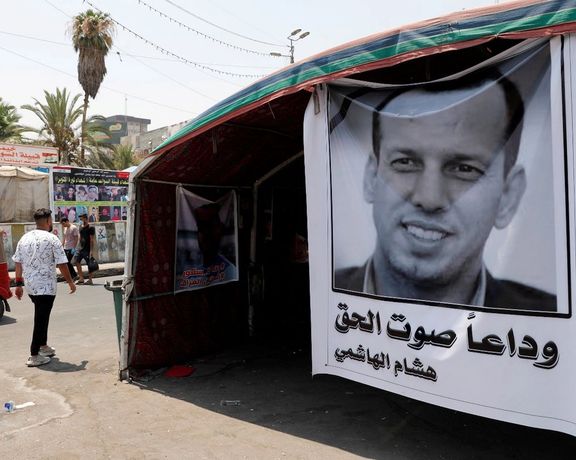
An Iraqi court Sunday sentenced to death a police officer blamed for leading a group that gunned down well-known analyst and government adviser Hisham al-Hashemi three years ago in Baghdad.
Hashemi, who had advised the government on defeating Sunni Muslim Islamic State militants and curbing the influence of the pro-Iran Shi’ite militias, was shot dead outside his Baghdad family home in July 2020 by men on a motorbike.
The assassination came at a time of rising tension between former prime minister Mustafa Kadhimi's government and powerful Iran-backed militias and political parties who opposed him and accused him of siding with the United States.
A Baghdad court issued a death sentence on Sunday against Ahmed Hamdawi under Iraqi counter-terrorism laws, a judicial authority statement said.
Media were not allowed access, but a lawyer who attended the court session said Hamdawi did not say anything in the court in response to the judge's ruling.
He can appeal the sentence, a spokesman for Iraq’s Supreme Judicial Council in Baghdad said.
In 2021, Iraqi state television aired a video showing Hamdawi saying he led the group that killed Hashemi.
The government officials then described the killing of Hashemi, who had written about politics, Islamic State and the role of Iran-backed militias in Iraq, as a targeted killing but did not accuse any particular group.
Iran-aligned paramilitary officials denied any role in the killing. Some Islamic State supporters cheered his death, but no group had claimed the murder.
Reporting by Reuters

Iran had succeeded in reaching a deal with the United States in 2021 to lift the terrorist designation of the Revolutionary Guard, former President Hassan Rouhani says.
Rouhani in a meeting on May 3 with his former officials and aides said that before his term in office ended in mid-2021, his government had convinced the Biden administration not only to lift IRGC’s Foreign Terrorist Organization (FTO) designation by the Trump administration, but also to lift sanctions on Supreme Leader Ali Khamenei’s office and entities.
Rouhani has recently been holding regular meetings with his former aides, which is seen as an act of opposition toward hardliners, which control all three branches of the government.
One of the first foreign policy initiatives by the Biden administration in early 2021 was to launch indirect negotiations with the Islamic Republic to revive the 2015 JCPOA nuclear deal that former President Donald Trump had abandoned in 2018. This entailed lifting of sanctions that Trump had imposed.
The talks that lasted 18 months and eventually reached a deadlock in September 2022, were partly kept secret, and it is not clear if Washington had agreed to lifting the sanctions that Rouhani is taking credit for.
One thing which is clear is a five-month hiatus in the negotiations in Vienna from June to November of 2021 – the period from Iran’s presidential elections to when the new administration decided to return to talks.

Iran’s hardliners had readied themselves to capture the presidency, with Khamenei’s apparent blessing. The constitutional Guardian Council loyal to the Supreme Leader, disqualified most serious candidates, leaving the path open for Khamenei loyalist Ebrahim Raisi to get elected in a low-turnout vote.
Whatever Rouhani’s negotiating team had achieved in the nuclear talks from April to June 2021 became meaningless once the hardliners took office.
Rouhani was quoted by reformist media on Saturday as having said during his meeting that his government had wanted to solve as many problems as possible for the incoming administration. “Everything was completed for the revival of the JCPOA and was ready,” he was quoted as saying.
The former president went on to say, “When I informed the Supreme Leader [about lifting of the sanctions], he was very happy, but unfortunately this did not come to fruition.”
Rouhani also took credit for many domestic accomplishments and claimed that several major projects were almost completed and ready to be inaugurated by the new administration. He implicitly criticized the Raisi administration of not following up and leaving these projects in limbo.
In the wake of the unprecedented anti-regime protests last fall, reformist and centrist regime insiders have been trying to drive home the point that hardliners, having, monopolized power in parliament and controlled the presidency, have failed to solve the country’s multiple crises.
In fact, after the breakdown in the nuclear talks, the economic situation has worsened, with the national currency rial losing half its value against the US dollar, the euro, and other major currencies.
Many pundits and politicians have been blaming the deepening political and economic crises on the hardliners for not reaching a nuclear agreement with the United States, which would lift crippling sanctions.
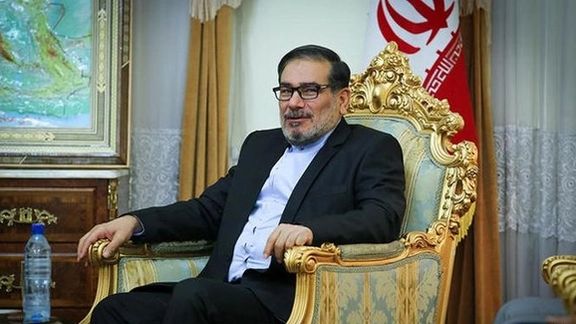
Iran’s top security official, Ali Shamkhani, has ridiculed US determination to stop the Islamic Republic developing nuclear weapons.
On Thursday, America’s National Security Advisor Jake Sullivan had warned that President Joe Biden will “take the actions that are necessary” to prevent Tehran creating an atomic bomb.
Speaking the next day, Iran's Supreme National Security Council (SNSC) secretary Ali Shamkhani said Sullivan’s statements are a “confession” that Washington is responsible for all so-called terrorist acts against the people and nuclear facilities of Iran.
The unsubstantiated claims by Shamkhani come amid mounting international concern over Iran’s nuclear weapons programme.
Sullivan had told Middle East experts at the Washington Institute for Near East Policy: “From my perspective, we are back in a position that we were in before where Iran is enriching, is advancing, and this nuclear program poses a genuine challenge to our fundamental non-proliferation goals.”
Elsewhere in his remarks, he said the US has made clear to Iran that it can never be permitted to obtain a nuclear weapon.
“As President Biden has repeatedly reaffirmed, he will take the actions that are necessary to stand by this statement, including by recognizing Israel’s freedom of action.”
In a sign of European concern, Britain, France and Germany also warned Iran on Friday that they would trigger a return of UN sanctions against Tehran if it enriched uranium to the optimal level for a nuclear weapon, three European officials said.
Western officials fear a nuclear-armed Iran could threaten Israel, Gulf Arab oil producers, and spark a regional arms race. Iran denies seeking nuclear weapons.
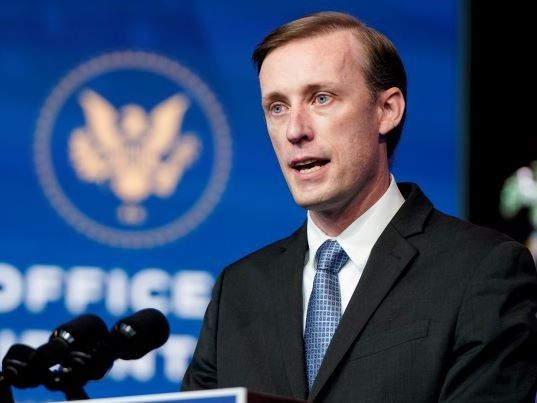
Israel is hoping for a breakthrough this weekend in efforts to normalize ties with Saudi Arabia during US national security adviser Jake Sullivan's visit there, a senior security official said on Friday.
The head of Israel's National Security Council, Tzachi Hanegbi, spoke on Wednesday with his counterpart Sullivan, who is set to travel to Saudi Arabia on Saturday. Sullivan is expected to meet with Saudi Crown Prince Mohammed bin Salman, Hanegbi said.
Announcing his trip on Thursday, Sullivan said Washington was working hard to normalize relations between Israel and Saudi Arabia - a major goal set by Israeli Prime Minister Benjamin Netanyahu who briefly joined Sullivan's video call with Hanegbi.
"We are very, very hopeful that there will be a breakthrough during his visit there," Hanegbi told Reshet 13 News.
Asked whether a breakthrough would be a phone call between Saudi leaders and Netanyahu, Hangebi said: "There are those who say that there have been more than phone calls between Saudi and Israeli leaders. But what is important is that the United States lead a move adding Saudi Arabia to the Abraham Accords - normalization and peace with Israel. If that happens it will be a historic turning point."
The US in 2020 brokered the historic Abraham Accords deal, which included the normalization of diplomatic relations between the United Arab Emirates and Bahrain with Israel, all of which share security fears over Iran.
While Riyadh signaled approval of the accords, it has held off on following suit, saying Palestinian goals for statehood should be addressed first.
Any such prospects have been clouded, however, by Riyadh's strains with US President Joe Biden, its recent fence-mending with regional rival Iran, and the rise of Netanyahu's hard-right Israeli government.
Report by Reuters
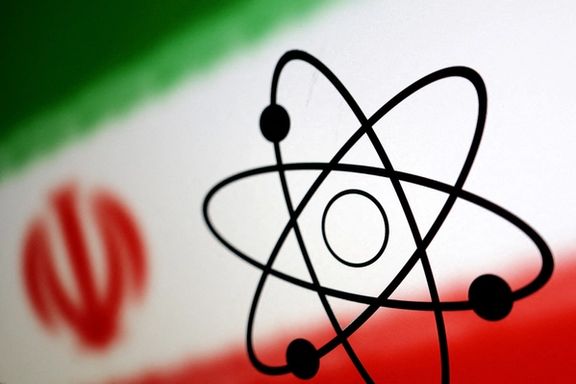
Even as the US and its European allies grapple with Russia's invasion of Ukraine and rising tensions with China, the smoldering crisis over Iran's nuclear program threatens to reignite.
In a sign of European concern, Britain, France and Germany have warned Iran they would trigger a return of UN sanctions against Tehran if it enriched uranium to the optimal level for a nuclear weapon, three European officials said.
The threat, made last year in a previously unreported letter sent by the countries' foreign ministers, underscores Western fears that Iran could produce bomb-grade uranium of 90% purity.
Those concerns intensified in February after UN inspectors revealed their discovery of uranium particles of 83.7% purity at an Iran nuclear facility built deep underground to protect it from air strikes.
A renewed crisis over Iran would come at a bad time for U.S. President Joe Biden who is focused on maintaining allies' support for the war in Ukraine and on rallying Western countries to push back on China's military and diplomatic ambitions.
But while some White House aides may prefer to keep Iran off the president's desk, officials and analysts suggested they may not have that luxury.
"They are busy with Ukraine, Russia and they don't want, for the time being, to open another front," said a Western diplomat on condition of anonymity. "Therefore, they want to do everything in their power to prevent this (90%) from happening."
'Snapback' Of UN Sanctions?
Western officials fear a nuclear-armed Iran could threaten Israel, Gulf Arab oil producers, and spark a regional arms race.
Iran denies seeking nuclear weapons.
US and European officials have been searching for ways to curb Tehran's program since the breakdown of indirect US-Iranian talks on reviving the 2015 nuclear deal between Iran, Britain, China, France, Germany, Russia, and the United States.
The accord, aimed at keeping Iran from developing a nuclear weapon, required Tehran to accept restrictions on its nuclear program and more extensive UN inspections, in exchange for an end to UN, US, and EU sanctions.
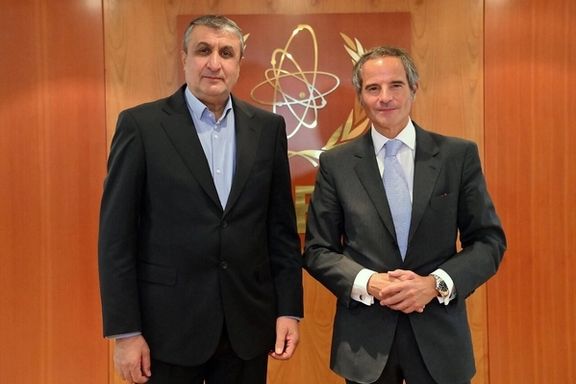
The deal, which had capped Iran's uranium enrichment at 3.67%, was abandoned in 2018 by then-US President Donald Trump, who argued it was too generous to Tehran.
Trump reimposed broad US sanctions, many of which have the secondary effect of forcing non-US firms stop dealing with Iran or risk losing access to the US market, but UN sanctions were not reactivated.
The deal had set out a procedure for the veto-proof "snapback" of the UN sanctions on Iran – including an oil embargo and banking restrictions – in response to Iranian violations. Any of the states who signed onto the original deal can trigger the snapback.
US sanctions - even with their secondary effects - have failed to keep Iran from producing ever-purer levels of uranium and China has flouted them by buying Iranian oil, making it unclear if the UN measures would be any more effective.
But Iran might refrain from enriching to 90% to avoid the public rebuke implicit in the return of UN sanctions.
A senior Iranian nuclear official said Tehran would not take the revival of UN sanctions lying down.
"If the other parties under any pretext trigger it, they will be responsible for all the consequences," he told Reuters. "Iran's reaction could range from leaving the NPT (Nuclear Non-Proliferation Treaty) to accelerating our nuclear work."
Leaving the NPT would free Iran to develop nuclear arms.
The Iranian official's threat was more explicit than comments by an Iranian foreign ministry spokesman, who on Monday said only that Iran had told Western powers how it would react.
It remains unclear if the 83.7% particles were created deliberately. But Western officials and analysts say that Iran's production of 90% uranium would demand a significant response.
A US State Department spokesman said Biden "is absolutely committed" to making sure Iran never obtains a nuclear weapon.
"We believe diplomacy is the best way to achieve that goal, but President Biden has also been clear that we have not removed any option from the table," the spokesperson added, hinting at the possibility of military action.
'Face A Crisis At Some Point'
While Western officials want to leave the door open for diplomacy, tensions with Russia and China make that harder.
Divisions over the Ukraine war, which has seen Iran provide military aid to Russia, and rising Sino-US tensions further reduce the odds of resurrecting the deal because it is unclear how hard Moscow or Beijing might push for its revival.
If the deal is dead, the West has three broad options: deterrence, military action, or a new negotiated arrangement.
Deterrence has a downside: it could give Tehran time to creep toward a nuclear weapons capability.
Dennis Ross, a veteran US diplomat now at the Washington Institute for Near East Policy think tank, suggested Biden may have to do more to make Iran fear the consequences of enriching to higher levels.
"If you don't do enough to persuade the Iranians of the risks they are running, you will face a crisis at some point because they will go to 90%" or move toward weaponization, he said. "What you are seeing is an effort to walk that tightrope."
Analysis by Reuters